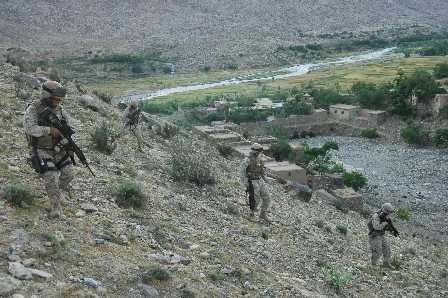 As suspected, the “NATO” casualties from a vehicle accident on Mar. 29 were in fact, U.S. troops from the 82nd Airborne.
As suspected, the “NATO” casualties from a vehicle accident on Mar. 29 were in fact, U.S. troops from the 82nd Airborne.On Monday, April 2, the DoD issued a news release.

They are Sgt. Edmund W. McDonald, 25, of Casco, Maine and Spc. Agustin Gutierrez, 19, of San Jacinto, Calif.
These good Americans were killed by accident during a convoy north of Kabul. They are not nameless coalition members – as initially released. Four days (96 hours) passed before the military released their names to the public – again, well past the average news cycle in today’s information age. (While I’m not a casualty assistance officer, I can guarantee it did not take that long to notify their families – the normal reason for a delay in release.)
SO, HOW WAS IT COVERED?
Kevin Maurer, a military writer for the Fayetteville Observer – the hometown paper to Fort Bragg where the 82nd Airborne is based – cranked out a story which was online by Tuesday morning (April 3).
Here is where you find that these troops are more than just nameless NATO troops who died in an unfortunate way in Afghanistan. McDonald served two previous tours in Iraq. He has a wife, a mother in Maine and other family who will miss him dearly. His commander called him one of his top non-commissioned officers, a dependable mechanic – literally the unsung nuts and bolts of our military who do their thankless jobs with pride.
In the small town of San Jacinto, Francisco and Elvira Guitierrez are now morning the loss of their teenage boy who died a world away.
Here is where you find that these troops are more than just nameless NATO troops who died in an unfortunate way in Afghanistan. McDonald served two previous tours in Iraq. He has a wife, a mother in Maine and other family who will miss him dearly. His commander called him one of his top non-commissioned officers, a dependable mechanic – literally the unsung nuts and bolts of our military who do their thankless jobs with pride.
In the small town of San Jacinto, Francisco and Elvira Guitierrez are now morning the loss of their teenage boy who died a world away.
And what do Americans know about this incident – and so many others that occur everyday in Afghanistan and Iraq?
This is not the pony express days of previous conflicts – this is the information age, where were should have the ability to access and understand combat situations in far off lands though our free fourth estate.
The few hits on the internet were simply AP wire copy – a regurgitation of the DoD news release. Yes, the local papers ran stories. The local reporters did their jobs, collected the DoD news release, the AP wire copy and then had the difficult task of interviewing the families. Their stories offer a glimpse of who these troops were.
The few hits on the internet were simply AP wire copy – a regurgitation of the DoD news release. Yes, the local papers ran stories. The local reporters did their jobs, collected the DoD news release, the AP wire copy and then had the difficult task of interviewing the families. Their stories offer a glimpse of who these troops were.
But most of us don’t read their local papers four or five days after we may have heard that “NATO” coalition soldiers died somewhere in Afghanistan – because we never make the connection and the news has moved on.
Portland Press Herald
http://pressherald.mainetoday.com/news/state/070331mcdonald.html
CBS San Jacinto
http://cbs2.com/topstories/local_story_092201538.html


1 comment:
"This is the information age, where we should have the ability to access and understand combat situations in far off lands through our free fourth estate." This states very well the way I would like things to be. I really appreciate your efforts here to make those connections for us. The action abroad is amazingly well-concealed. But there is another issue that you haven't touched on yet. Many people just don't know the basics of combat; I certainly don't. Even the most basic description of the circumstances surrounding a soldier's death are confusing to me. I don't know what weapons soldiers are using and how they fill their days. This information is key to understanding combat situations, yet it's not communicated very often in the news. It's usually reserved for talk shows that feel they have the time and the right to provide "perspective" meaning addressing various opinions and providing background. And in those shows, the source of information is often just one expert being interviewed who has not served in Iraq or Afghanistan in the past decade. So my point is that there is an opportunity to build up cultural literacy about combat, and that this would motivate people to make these connections and fill in the blanks when it comes to daily news events.
Post a Comment